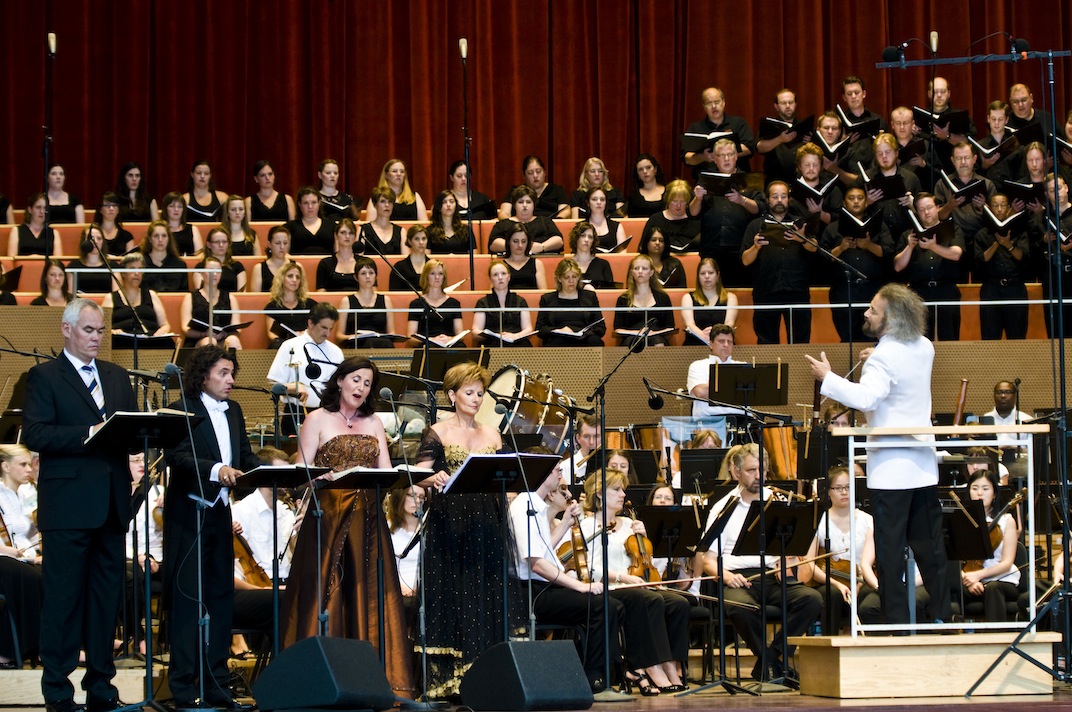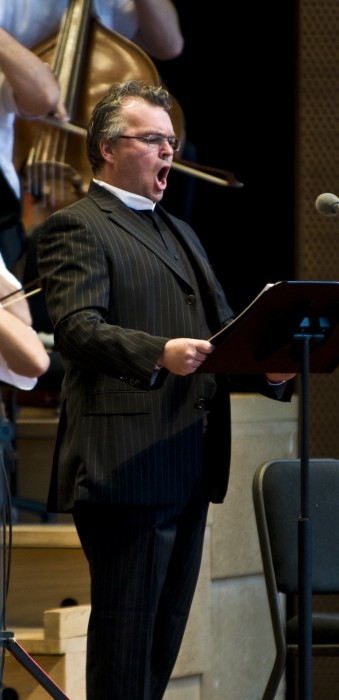Kalmar, Grant Park Orchestra and Chorus give stirring advocacy to uneven Schmidt oratorio

Carlos Kalmar conducts the Grant Park Orchestra and Chorus with soloists in the Chicago premiere of Franz Schmidt's "The Book with the Seven Seals" Friday night at the Pritzker Pavilion. Photo: Norman U. Timonera
“I think it helps to be Austrian and Catholic,” I said to a colleague at intermission regarding the evening’s performance of Franz Schmidt’s The Book with the Seven Seals.
“I’m Austrian and a lapsed Catholic and it’s not helping,” he replied.
The Grant Park Music Festival presented the belated Chicago premiere of Schmidt’s late Late Romantic (1937) oratorio Friday night with Carlos Kalmar leading a quintet of Austrian singers and the Grant Park Orchestra and Chorus.
The festival’s venturesome programming remains one of the most laudable elements of Chicago’s bustling music scene. But with some inspired passages, a superb lineup of vocal soloists and a full-blooded performance from the Grant Park forces, even Kalmar couldn’t quite make a convincing case for Schmidt’s long, often turgid oratorio.
Setting the Book of Revelations clearly inspired the Hungarian-born Austrian composer, a devout Roman Catholic who had seen his share of tragedies in life.
The oratorio is cast on an epic scale, spanning nearly two hours, and calling for large orchestra and chorus, organist and six (or five, as here) vocal soloists. Schmidt was an able orchestrater, as shown in his four symphonies, and The Book with the Seven Seals is his most celebrated work, displaying a whipcrack audacity in writing for large forces, with the text’s metaphorical religious symbolism sparking some undeniably colorful scoring from the composer.
To be sure there are worthy moments over the 105-minute journey: the lovely lyrical vocal quartet for “The Four Beasts,” set against the chorus; the plaintive pastoral oboe solos for the Lamb of God section; the majestic opening up of chorus, organ and orchestra (“Thou art worthy to take up the book”); the strange stasis and weird percussion for The Two Survivors; and, most famously, the massive fugal choruses.
Yet ultimately, Schmidt’s oratorio is not held together convincingly or with enough indelible thematic material to support the vast edifice with just as many lumbering, uninspired passages as rousing moments.
Often Schmidt’s devotion to the text makes for starkly unsatisfying dramatic results. The exhilarating fugal Hallelujah Chorus near the end seems to be the blazing finale — most of the lawn audience seemed convinced the work was over — but is then followed by an anticlimactic monastic section for a cappella male chorus (“We thank Thee, O Lord, Almighty God”), a reprise of the Evangelist, and brief final Amen. Verdi or Puccini would have had no hesitation shredding the sacred texts for a more effective and dramatic conclusion.
While it’s hard to make a claim for The Book with the Seven Seals as a neglected masterpiece, the oratorio received stirring advocacy in its belated local premiere Friday by Kalmar and the Grant Park forces.

Tenor Robert Künzli performed the role of St. John in "The Book with the Seven Seals." Photo: Norman U. Timonera
The performance was aided immensely by a superb lineup of soloists. In the prominent narration role of St. John, Robert Künzli was first class across the board. His lean, vibrant Heldentenor proved eminently well suited to this demanding music with notable power and ping on top. Throughout he brought poised and expressive singing to the text, particularly to the long solo section of Part Two depicting the opening of the Seventh Seal.
Albert Pesendorfer’s resonant voice was well suited to the Voice of the Lord, and, resembling a distinguished silver-haired Viennese banker, the towering bass even looked the part. Soprano Edith Lienbacher, mezzo Christa Ratzenböck and tenor Alexander Kaimbacher formed the rest of a rich voiced and well-blended quartet as well as proving compelling in their individual assignments.
Prepared by William G. Spaulding for these performances, the Grant Park Chorus sang with notable resplendence and energy, tackling the daunting fugal choruses with admirable polish and dramatic conviction. Under Kalmar’s exacting direction, the orchestra brought imposing power and brassy brilliance as well as elegance and nuance to Schmidt’s unwieldy score. David Schrader provided his usual understated versatility and expressive poise in the chromatic, Gothic horror film organ solos.
Note: The Pritzker amplification sounded like it was boosted to a higher level than usual Friday making for some strident fortissimos and artificially souped-up climaxes.
The program will be repeated 7:30 p.m. Saturday at the Pritzker Pavilion. Admission is free. grantparkmusicfestival.com